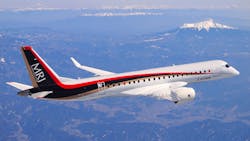Mitsubishi Heavy's New Jet Racks up Fifth Delay
Mitsubishi Heavy Industries Ltd. announced a fifth delay in handing over Japan’s first locally made passenger jet to airlines and about a 30% jump in development costs, raising concerns about winning new orders for the single-aisle plane.
Launch customer ANA Holdings Inc. will get the aircraft in 2020, two years later than the current estimate, Mitsubishi said in Tokyo on Monday. St. George, Utah-based SkyWest Inc. is the plane’s biggest customer. Revision of some electrical configuration to meet certification requirements prompted the latest pushback of the deadline.
The Japanese conglomerate has brought in bullet-train engineers and flown the jets to the U.S. to speed up certification as it attempts to break into the dominance of Brazil’s Embraer SA and Canada’s Bombardier Inc. in the market for aircraft with fewer than 100 seats. The move is “debilitating” for Mitsubishi, said Saj Ahmad, an analyst at London-based StrategicAero Research.
“The MRJ delays not only hand the advantage to competitors, but will make the MRJ harder to sell," Ahmad said. “It’s clear that the technical obstacles preventing its certification are presently out of scope for Mitsubishi to contain.”
Already Tripled
Mitsubishi Chief Executive Officer Shunichi Miyanaga on Monday didn’t say from what base the costs were going up. Chief Financial Officer Masanori Koguchi said in June that the jet’s development costs had already tripled to as much as 600 billion yen ($5.3 billion) from initial estimates. Miyanaga declined to provide new data on costs.
Mitsubishi Aircraft Corp. has flown three MRJ planes to the U.S. for testing, following setbacks last year. Even with the delays, Mitsubishi has an advantage because it’s developing an aircraft with a new design, a company spokeswoman said.
“We’re explaining everything in detail to our stakeholders,” Miyanaga said. “We’re facing the risks and taking a forward-looking attitude.”
Plane Orders
Mitsubishi Aircraft, a subsidiary of the conglomerate, has 447 orders for the plane, including options and purchase rights. ANA, the operator of Japan’s biggest airline, said it was “disappointed” at this latest delay, but will continue to support the development of the jet as its launch customer.
“We remain confident of the benefits the MRJ will bring to the ANA fleet in terms of performance and passenger comfort,” the carrier said in an e-mail statement. It has 25 of the planes on order, including options.
SkyWest, which operates regional flights on behalf of Delta Air Lines Inc., American Airlines Group Inc., United Continental Holdings Inc. and Alaska Air Group Inc., has an order for 200 planes including options.
“Our conditional firm orders of the MRJ aircraft remain unchanged, and are dependent on flying contracts and scope availability,” SkyWest said by e-mail.
The plane builder has as many as 100 orders from Trans States Airlines Inc., also based in the U.S.
The jet, which can seat as many as 92 people, made its first flight in 2015 and won its first order from a European company in February.
Japan’s last locally produced commercial aircraft was the YS-11, a turboprop made by Nihon Aircraft Manufacturing Corp., a consortium that included Mitsubishi Heavy, Kawasaki Heavy Industries Ltd. and Fuji Heavy Industries Ltd. Production was stopped in 1974 after 182 of the planes were sold.
About the Author
Bloomberg
Licensed content from Bloomberg, copyright 2016.
